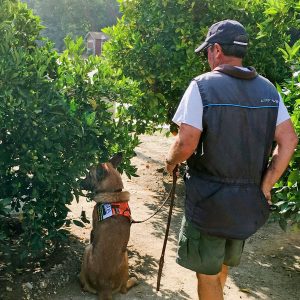 Dogs specially trained by Agriculture Research Service (ARS) scientists have proven to be the most efficient way to detect huanglongbing, better known as citrus greening.
Dogs specially trained by Agriculture Research Service (ARS) scientists have proven to be the most efficient way to detect huanglongbing, better known as citrus greening.
Currently, the only solid hope of curtailing the spread of citrus greening is to eliminate trees with the disease as quickly as possible to prevent further spread. Early detection of the citrus greening pathogen is crucial because trees can be infected and act as a source to spread the disease months or years before showing symptoms that are detectable by the naked eye.
ARS plant epidemiologist Timothy R. Gottwald with the U.S. Horticultural Research Laboratory in Fort Pierce, Florida, discovered that dogs can be trained to sniff out the presence of Candidatus Liberibacter asiaticus, the bacteria that causes citrus greening, with greater than 99 percent accuracy.
“We found that, once trained, these dogs were able to identify infected trees within two weeks of the trees being inoculated,” Gottwald said. “The dogs also were able to distinguish the citrus greening pathogen from a variety of other citrus bacterial, viral, fungal, and spiroplasma pathogens, including closely related Liberibacter species.
So far, the program has trained 19 dogs obtained from European breeders of detection canines because of their keen abilities and drive. Learn more from USDA-ARS and watch the video.
